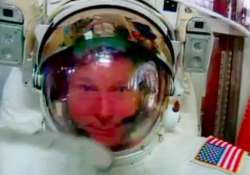Spacewalking astronaut safe after water leaks into helmet
CAPE CANAVERAL, Florida: Spacewalking astronaut ended up with unwanted water in his helmet Wednesday after breezing through a cable and lube job outside the International Space Station.The leak was scarily reminiscent of a near-drowning outside

CAPE CANAVERAL, Florida: Spacewalking astronaut ended up with unwanted water in his helmet Wednesday after breezing through a cable and lube job outside the International Space Station.
The leak was scarily reminiscent of a near-drowning outside the orbiting complex nearly two years ago.
This time, the amount of water was relatively small -- essentially a big blob of water floating inside Terry Virts' helmet. In the summer of 2013, another spacewalking astronaut's helmet actually flooded. He barely made it back inside.
Virts was never in any danger, Mission Control stressed, and he never reported any water during his 6½ hours outside.
This was the second spacewalk in five days for NASA astronauts Virts and Butch Wilmore, who encountered no trouble while routing cables for future American crew capsules, due to arrive in a couple years.
Three spacewalks had been planned, with the next one Sunday, but its status was uncertain given Wednesday's mishap. Managers will meet Friday, as planned, to discuss the situation.
Wednesday's spacewalk had just ended and the two astronauts were inside the air lock, with the hatches closed, when the incident occurred. The air lock was being repressurized when Virts first noticed the water. He said he reported it about a minute later.
The absorbent pad inside the back of Virts' helmet was damp, but not saturated, said Italian astronaut Samantha Cristoforetti, one of the station's six crew members. The pad became standard procedure after the 2013 emergency.
Cristoforetti removed Virts' helmet and wiped his face with a towel once he was out of the air lock and reunited with his colleagues. She noted that his neck was wet and cold.
The water -- cold to the touch with a chemical taste -- most likely came from the suit's cooling system, the source of the leak in 2013. Mission Control described the amount of water as "minor," at least compared with 2013.
Virts, a 47-year-old Air Force colonel, spent about half of Wednesday's spacewalk lubricating screws, brackets and tracks on the end of the space station's giant robot arm. The snares had gotten a bit creaky over the past year, increasing the motor current, and engineers hoped the grease would make operations smoother.
"We're the cable guys. Now we're the grease monkeys -- or I am," Virts radioed.
"Yep, you guys have a life after NASA," replied Mission Control. "That's good work."
That's when the spacewalk ended -- and Virts noticed the water. A camera zoomed in on a big bubble floating near his left eye.
"Yeah, Terry, we can see it. Thanks for making it ripple," Mission Control said.
The same suit ended up with some water in the helmet during a Christmas Eve spacewalk in 2013, according to Mission Control. That also occurred while the air lock was being repressurized.
NASA spent months investigating the July 2013 close call experienced by Italian astronaut Luca Parmitano, and zeroed in on clogged holes in the fan and pump assembly.
A corrosion problem with the same type of fan and pump assembly -- believed unrelated to the original leak -- had to be cleared before the latest spacewalks could get underway last weekend. The analysis held up the spacewalks by a day.
NASA considers this the most complicated cable job ever at the 16-year-old orbiting outpost.
So far, Virts and Wilmore have routed 364 feet of power and data cables, with another 400 feet (120 meters) to be strung outside the space station on the next spacewalk, whenever it happens.
NASA had hoped to complete this series of spacewalks before Wilmore returns to Earth in mid-March.
The extensive rewiring is needed before this year's arrival of a pair of docking ports, designed to accommodate commercial crew capsules still in development. NASA expects the first port to arrive in June and the second in December.
SpaceX and Boeing are designing new capsules that should start ferrying station astronauts from Cape Canaveral in 2017. Manned flights have been on hold at the cape since NASA's shuttles retired in 2011. SpaceX already is launching station cargo.
NASA has contracted out space station deliveries so it can concentrate on getting astronauts farther afield in the decades ahead, namely to Mars.
